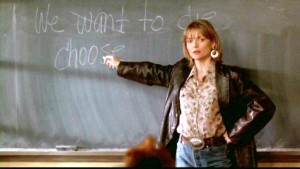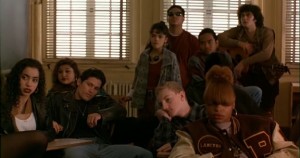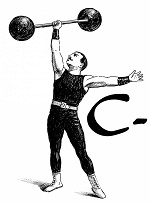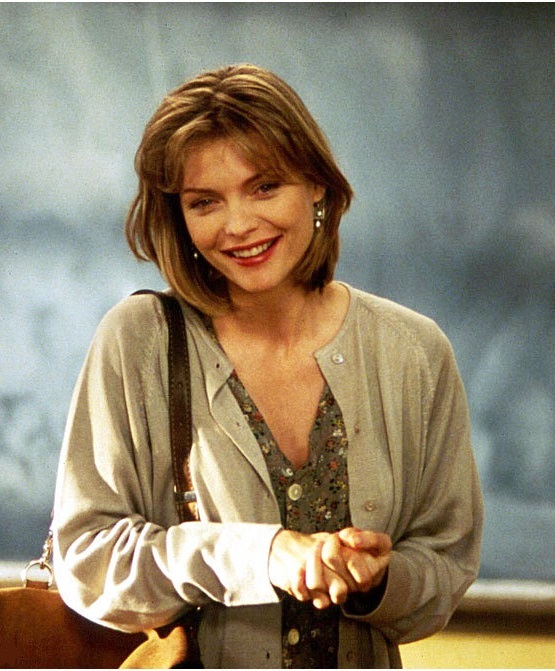1995 was the mid-way point of the best decade on record, and over that summer, one of the most popular “tough teacher takes on tough students” movies was released. Promoted heavily via the Grammy winning song “Gangsta’s Paradise” (by rapper Coolio), “Dangerous Minds,” was based on the autobiography ‘”My Posse Don’t Do Homework” by former U.S. Marine LouAnne Johnson. In 1989, Johnson took a teaching position at Carlmont High School in Belmont, California, where most of her students were black and hispanic teenagers from East Palo Alto, a then-unincorporated town at the opposite end of the school district.
Directed by John N. Smith, and produced by Don Simpson and Jerry Bruckheimer, “Dangerous Minds” suffers from typical pitfalls in its attempt at shoving a social message down viewers’ throats, mixing in a classroom of “kids” (clearly portrayed by adult actors) with stereotypical characteristics and little to no depth. Multiple plot lines are created, explored, and resolved with nothing to show in a manner of minutes, while some are left completely unscratched. “Dangerous Minds” seems like an excuse to showcase a hip urban soundtrack. It feels as though the movie was a result of the song by Coolio, as opposed to the success of the song being a result of the movie.
The movie opens with scenes of kids in poor gang-controlled and graffiti-infested neighborhoods boarding busses en route for theschool while “Gangsta’s Paradise” plays in its entirety. LouAnne Johnson (Michelle Pfeiffer) is arriving for an interview at the school. The former Marine highlights a diversified background; and though she did not complete her certification for teaching, she is hired for a full time position on the spot. Shocked and pleased, LouAnne is told she will be overseeing the ominous “academy class.”

LouAnne is excited for her first day though that quickly wanes as she meets her class – a room of loud, unruly, and obnoxious students (most black or latino) that immediately nickname her ‘White Bread.’ The students come from tough and poor streets (though one somehow has a gold tooth). LouAnne quickly runs out of the classroom after some cheesy and over-the-top insults are hurled her way (thankfully this Marine never saw actual combat. You’ll second guess the notion of women in the military as LouAnne succumbs to the pressure of teenagers calling her ‘White Bread’). In the hallways, she begins asking her friend and fellow teacher Hal (George Dzundza) about the class. “Are they rejects from hell?” She asks. Hal explains they are bright kids with social problems. Within sixty seconds, LouAnne has decided she can’t teach them.
The next scene shows her at home that night (never really answering what she did the rest of her first day) reading a book titled “Assertive Discipline.” (We’re now ten minutes into the film and this will be the first of many eye rolls). LouAnne quickly determines the answers to being a good teacher won’t come from a book and she returns the next day with a vengeance. After a quick karate lesson, LouAnne is able to start gaining trust and respect from the students and promises them all an ‘A’ if they put forth effort. “If you want to pass all you have to do is try.” She implores them. Why in the world a group of boisterous would-be-criminal hoodlums would care about a grade in an English class is not really explained, but one student, mister gold tooth, has an opinion. “It’s bullshit.” Another student, Raúl (Renoly Santiago) retorts “What of it ain’t bullshit. I ain’t never had no (expletive) ‘A’ before.” Problem solved right? Wrong.
 LouAnne is ushered into the office of Principal George Grandey (Courtney B. Vance), where he chastises her methods and tells her to follow the curriculum distributed by the Board of Education. In class the next day, the de facto leader of the students Emilio (Wade Domínguez) complains “Since when has the Board of Education done anything for us?” Which comes across as a strange thing for a street hoodlum to say (like how would he even know what the Board of Education is?) LouAnne seems poised to challenge the Board, but that angle is immediately dropped and the Board is not referenced again.
LouAnne is ushered into the office of Principal George Grandey (Courtney B. Vance), where he chastises her methods and tells her to follow the curriculum distributed by the Board of Education. In class the next day, the de facto leader of the students Emilio (Wade Domínguez) complains “Since when has the Board of Education done anything for us?” Which comes across as a strange thing for a street hoodlum to say (like how would he even know what the Board of Education is?) LouAnne seems poised to challenge the Board, but that angle is immediately dropped and the Board is not referenced again.
The social issues start flying like mud – Hal complaining that the school has no pens or paper, and too many students. Fellowteachers are shown not really caring about the students, yet this plot angle is also not developed at all. Rather we see LouAnne quickly forging a bond with her students by bribing them with candy like dogs and taking them to an amusement park. This is when you begin to consider the sneakiness of the title; “Dangerous Minds” isn’t a reference to the tough students, it’s a reference to the teachers and school board itself. Clever clever!
The rest of the movie plays out exactly as you would guess, with predictable scenes (one has the dismissal bell ringing literally a minute after the class started) and over-the-top social pandering. Every one of the students is made out as a victim due to circumstances out of their control which robs the movie of the toughness found in a similar (and infinitely better) movie “Lean on Me.” It’s a good thing Michelle Pfeiffer is cute because she isn’t much of an actress, at least not in this role. The writing is quite poor and the entire movie comes across as bland.
If you want the cliff notes for “Dangerous Minds,” watch the “Gansta’s Paradise” video and you’ll get the gist of the entire movie in three minutes.
– by Matt Christopher



1 Comment
does anyone like this movie?